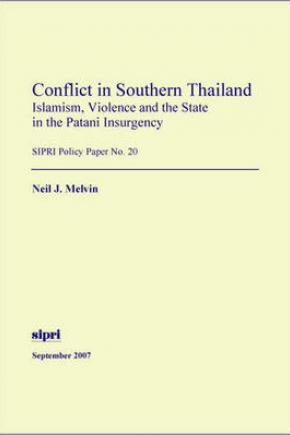Conflict in Southern Thailand: Islamism, Violence and the State in the Patani Insurgency
Conflict in Southern Thailand: Islamism, Violence and the State in the Patani Insurgency is a study of the insurgency taking place in the southernmost provinces, which pits groups of Malay Muslim militants against Thai security forces and—particularly in recent years—against teachers and other local public sector workers, Buddhist monks, Muslim ‘collaborators’, and other civilians. The conflict has already claimed more than 2400 lives and had major political repercussions. With the insurgents apparently in the ascendant, many inhabitants leaving their homes, and the government running out of new approaches beyond arming more local militia, the violence threatens to escalate further, with potentially grave consequences for Malaysia, Indonesia and beyond.
In this Policy Paper, Neil J. Melvin—a former head of SIPRI’s research programme on Armed Conflicts and Conflict Management—offers both an introduction to this little-known conflict and an analysis of the causes, character and dynamics of the insurgency. In particular the paper examines the interplay between Islamic, ethnic and national identities in the region; the grievances shared by many local Malay Muslims, which have their origins in the Thai state- and nation-building efforts of the early 20th century; and recent political developments in Thailand. The paper argues that any effective response must balance security-led counterinsurgency with attempts to address the demands of the Malay Muslims for respect of their rights and genuine political engagement, which may eventually include the current generation of insurgents.
This Policy Paper is the second output of a research project, Conflict, Islam and the State-Nation: New Political and Security Challenges funded by the Swedish Ministry of Foreign Affairs (January 2006-September 2007).
Click here to download Policy Paper No. 20
About the author
Dr Neil J. Melvin (United Kingdom) is Reader in Conflict Studies at the University of Kent's Department of Politics and International Relations, located at the Brussels School of International Studies. He was Leader of the SIPRI Armed Conflict and Conflict Management Project from 2005 to 2006. Prior to joining SIPRI, he served as Senior Adviser to the High Commissioner on National Minorities of the Organization for Security and Co-operation in Europe. He is the author of a number of books and articles on security and conflict in Eurasia. His publications for SIPRI include 'Islam, conflict and terrorism' in SIPRI Yearbook 2006: Armaments, Disarmament and International Security (Oxford University Press) and Building Stability in the North Caucasus: Ways Forward for Russia and the European Union, SIPRI Policy Paper no. 16 (May 2007).
1. Introduction
2. The contemporary conflict
3. The historical roots of the conflict
4. Islamism and the Patani insurgency
5. Thai politics and the re-emergence of conflict
6. Future directions

